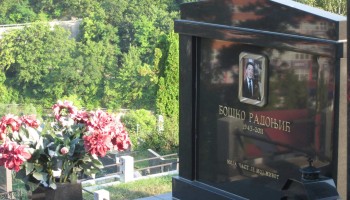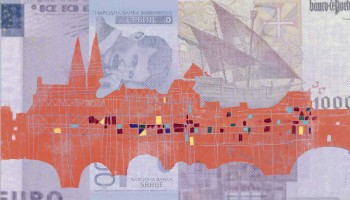Reported by
The shadow of Stanko Subotić has long stalked Serbian President Aleksandar Vučić. Allegations of links between the businessman with ties to organized crime and the country’s top politician have often been levelled, but never proven.
Subotić, convicted of large-scale cigarette smuggling in 2011 and handed six years in prison, before being controversially cleared a few years later, has insisted he only ever backed Vučić at the ballot box, never financially.
While opposition politicians and media allege there are deeper ties between the politician and businessman, always without proof, the two steadfastly deny any connection. Such ties would be problematic for the president because of Subotić’s former convictions (since reversed) for criminal activities, and evidence of ties between Subotić and regional drug lord Darko Sarić.
But despite Vučić’s moves to distance himself from Subotić, OCCRP and its Serbian member center KRIK have found that Nikola Petrović — a man known to be very close to the president who describes himself as Vučić’s “best man,” or kum in Serbian — has in fact done business with Subotić.
Petrović established a shell company in Luxembourg in early 2019 through which he ran various Serbian business ventures, including interests in air transport, solar energy, and pharmaceuticals. A closer look into some of these holdings by OCCRP’s Serbian member center KRIK offers the first documented evidence tying Subotić’s network to the president’s inner circle.
About the Project
“I am not a public figure,” Petrović told reporters when asked about his business dealings. “I do not need to answer your questions and you absolutely don’t have the right to ask me questions. I will report you for harassing me.”
Petrović is, despite these protestations, a well-known and influential figure in Serbia.
So important is his role that he was named in a letter sent by five U.S. members of Congress to then-Vice President Joseph Biden in September 2015, days before Vučić visited the U.S. The legislators were concerned, they wrote, that a small group led by Vučić’s brother Andrej, and including Petrović, had “consolidated their influence and interest in energy, telecommunications, infrastructure and all major businesses in Serbia.”
Our reporting shows that more than five years on, Petrović remains well situated to benefit from a range of state-backed initiatives. As he does so, the looming figure of Subotić is never far away.
Subotić’s Ties to Drug Lord Darko Sarić
Subotić has numerous connections to Montenegro drug lord Darko Sarić, OCCRP has previously reported.
The Luxembourg Connection
In October 2018, Subotić moved his holding company, Emerging Markets Investments (EMI), from Denmark to Luxembourg. Initially, he based the company in the capital city, Luxembourg, at the address of Auditex, a tax consulting firm. When Auditex later moved to Leudelange, a small town in the southwestern part of the country, EMI moved with them.
Petrović established his own company, Fabergé Advisors, months later in January 2019. Although its structure is complex — Fabergé Advisors was founded by a company based in the U.K., with its last known main shareholder a Cyprus-registered company — Petrović is listed as the beneficial owner.
Fabergé Advisors, as it turns out, uses the same directors and the same address as Subotić’s holding company, EMI. That address is the offices of the parent company of Auditex, the tax consulting company used by Subotić.
The connection is not definitive because more than 400 additional companies are also registered at the same address, indicating it may be in use by a registration agent. The shared directors are likely proxies — individuals from France and Belgium who appear as managers in numerous companies in Luxembourg.
But there are more direct business relationships. Petrović and Subotić share an interest in aviation.
In October 2020, Petrović branched into the sector by using Fabergé Advisors to buy the air transport firm Air Posh for what appears to be a knockdown price of 100,000 euros, a contract shows. The seller was Subotić, using a subsidiary of EMI. Subotić had established Air Posh through a series of companies just a year and a half earlier, in April 2019.
While under Subotić’s ownership, Air Posh had bought a Cessna 550 aircraft from a New York company. The airplane alone is worth between 700,000 and 1.3 million euros, according to websites that advertise such prices, indicating that for 100,000 euros, Petrović may have bought Air Posh at a huge discount. (Neither Subotić nor Petrović would respond to questions on the sale from OCCRP and KRIK, and it is possible there were additional terms of the deal not known to reporters.)
The plane at one point was used by Air Pink, an air transport company co-owned by media magnate Željko Mitrović, who had close ties to the former regime of Serbian strongman Slobodan Milosević. Mitrović’s TV Pink is considered by Serbian media analysts to be the strongest vehicle for what they say is Vučić’s propaganda.
Under Petrović, Air Posh kept its registered office in a building where Subotić owns several apartments in Belgrade, and the airline continued to use the Cessna, according to information from the Civil Aviation Directorate of the Republic of Serbia. Borislav Radić, a pilot who, according to his LinkedIn profile, previously worked for Air Pink, was named director of Air Posh after Petrović took over the company. The Cessna is still listed on the Air Pink website as part of its fleet.
Under Petrović’s ownership, Air Posh flies clients from its Serbian base mostly to Vienna, but also to Brussels, Rome, Amsterdam, Moscow, Kyiv, Bodrum, Beirut, Tel Aviv, Sharm El Sheikh and Dubai, according to websites that record flight information.
Neither Subotić nor Petrović would answer questions from OCCRP or KRIK.
Subotić’s Controversial — and Complex — Smuggling Trial
Subotić’s trial for cigarette smuggling was a controversial one.
Thriving in Private
After President Vučić's party came to power in 2012, Petrović was made director of a state-owned company controlling electrical transmission. Leaving this role in late 2016, he went on to thrive in the private sector, producing electricity via mini-hydropower plants — electricity he sold to the Serbian state for millions of euros.
When buying companies in Serbia, Petrović took pains not to expose himself. Indeed, some of his new business partners told reporters they didn’t know he was the one behind the company with which they had signed contracts.
Again through the Luxembourg-based Fabergé Advisors, he expanded his portfolio in August 2019, by purchasing a 50-percent stake in Serbian company Storenergy, a solar energy company which filed a patent application for a “solar concentrator, receiver and thermal storage,” records show.
His new partner in this business, Marko Vuksanović, told OCCRP/KRIK he didn’t realize that the buyer was the Serbian president’s “best man.” Asked with whom he negotiated when he sold part-ownership, he said he dealt “with a few people who are representatives of that [Fabergé Advisors] investment fund. ... They are some French people.”
The solar contract was signed on Petrović’s behalf by Vladimir Krkobabić, a director in many companies owned by Subotić. Petrović paid 50,000 euros to Vuksanović for his half-share of Storenergy, according to a contract seen by OCCRP and KRIK.
Storenergy has installed one small solar concentrator on Avala mountain, near Belgrade, and a bigger one near the town of Kragujevac in central Serbia, according to the company’s website.
With the Serbian government investing millions of euros into renewable energy in the coming years, those involved in this business, including Petrović, could be poised to book large profits.
Moving Medicines
Third among Petrović’s new business interests is pharmaceuticals.
In September 2020, once more via Fabergé Advisors, he took majority ownership of Serbian company Krasius, which one year earlier had received permission to import drugs for clinical trials, according to documents obtained from the Serbian Ministry of Health by OCCRP/KRIK. The ministry is run by Zlatibor Lončar, one of a handful of Vučić associates with alleged ties to organized crime.
Just a month before Petrović took ownership, this company received another permit, from Medicines and Medical Devices Agency of Serbia, to import 960 vials of CIMAher, a drug produced by the Center for Molecular Immunology in Cuba. Data from the agency shows that the CIMAher was for use by a private Belgrade clinic called Vesalius. CIMAher is a non-registered medicine in Serbia, but some websites advertise it as an anti-cancer treatment.
According to a Cuban medical services company contacted by KRIK, the price for one vial is $400, meaning that the retail value of the shipment would be $380,000. Yet according to the contract paperwork, Petrović paid just 51 dinars (50 U.S. cents) for a 51-percent controlling share of Krasius from Ivan Krasić, an ex-basketball player for the French club Cholet. Krasić told reporters he didn’t originally know Petrović was the one buying a stake in his company.
Much like Vuksanović, Krasić insisted he had initially been completely in the dark as to who his new partner was.
“I don’t know Petrović,” he said. “Some lawyers called me and asked me to sell part of the company. I was in need of money.” Krasić said he had only heard that Petrović was behind the deal when they were “finishing” it.
But if Krasić badly needed cash, the selling price of 51 dinars wouldn’t have been of much use to him. When asked by reporters how much he had really been paid, Krasić replied that it was “a trade secret.”
“I don’t have anything to do with politics,” he said. “That is not my world. They are big players. I am a modest man. I play basketball.”









